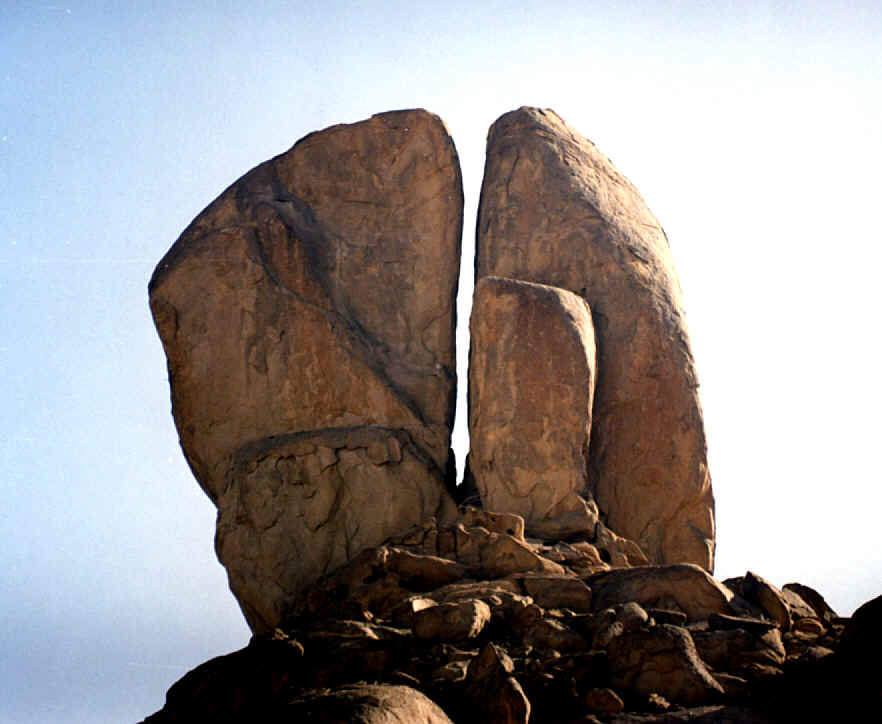[Greek] σχίσμα (schisma), [Latin secta]: split, division, gap, schism, rent, separation, dissension, cleft; Mt.9:16, Mk. 2:21, Jn.7:43, Jn. 9:16, Jn. 10:19, 1Cor.1:10, 1Cor.11:18, 1Cor.12:25

Split Rock at Horeb: Moses struck the rock and water welled out to provide drink for the people.
Background Information:
Secular Hellenism: This term, occurring in the natural sciences and philosophy (faith), means what is split, rent, and rift. In botany, this refers to the veins (in a maple leaf) being split off from a single point. In philosophy, Zeus Hypsistos, a sect from 200 BC- 400 AD, made votive reliefs, dedicated to the aspects of this god having to do with personal well-being. In Greek hypsistos means the most high God. The worship of Zeus as Hypsistos is probably Thraican or Macedonian in origin. The Temple of Zeus Hypsistos is located in present day Syria. The Guild of Zeus Hypsistos had rules prohibiting schisms and disagreement at the meal
Old Testament: This term, meaning cave or crevice, is rarely found in its noun form. Its verb form means to tear apart, to split (cut), to tear, and to separate (divide). There are scriptural references to the caves (abyss) of the mountains, and crevices in the cliffs. The other scriptural references allude to an active sense of separating and dividing. Abraham cuts the wood for the burnt offering (Gen.22:3). Eliakim, Shebna, and Joah come to Hezekiah with their garments torn (Isa.36:22). Like a bird flying through the air (Wis.5:11). Judas’ troops retreated from the enemy (1Macc.6:45). The Jordan river was split (Ex.14:21). He cleft the rock and waters welled forth (Isa.48:21). The Mount of Olives will be split in two from east to west (Zech.14:4).
New Testament: This term, found in the gospels and the first book of Corinthians, means a tear (split) and division (social dissension). Examples include a torn cloth and Jesus’ actions (causing division, confusion, dissension, and distrust among the Jews). Paul was addressing dissension and confusion among the Corinthians. The factions (and their respective doctrinal differences) among the Corinthians were not clearly defined. Paul stressed the need for unity in faith in body and mind. This belief in the god of the Most High was widespread in Asia Minor. In Phllippi, Paul encountered an oracle (seer) who proclaimed, “These people are slaves of the Most High God, who proclaim to you a way of salvation.” Paul immediately commanded the spirit to come out of her. The Hypsistarians were a mixture of God-fearers and Gentiles. This group rejected idols, rejected non-Abrahamic sacrifices, acknowledged the Creator as the Most High, kept the sabbath, and rejected circumcision. In contrast to the Christians, the Hypsistarians refused to call the Creator as Father. Ironically, the Hypsistarians may have contributed to the rapid spread of Christianity in Asia Minor.
Scripture:
“So some of the Pharisees said, ‘This man is not from God, because He does not keep the Sabbath.’ Others said, ‘How can a sinful man do such signs?’ And there was division among them.” Jn. 9:16
Jesus words and actions caused confusion for others. They questioned why Jesus did not keep the Sabbath. They could not understand how He could perform miracles and signs.
“Again there was a division among the Jews because of these words.” Jn.10:19
The Jews were disturbed by Jesus’ actions. Some Jews could not accept His teachings. Some Jews walked away.
“No one patches an old cloak with a piece of unshrunken cloth, for its fullness pulls away from the clock and the tear gets worse.” Mt.9:16
This is a saying of the unsuitability of attempting to combine the old and the new. Jesus teaching is much greater than Judaism and the Mosaic Law.
Conclusion:
Schism, schismatic, sect
I was surprised that a maple leaf would be used as an example to show splitting and dividing from a point. I find it quite ironic that the Hypsistarians would later serve as an impetus for the rapid growth of Christianity.
In the wilderness the people were asking Moses, “Give us water to drink.” At the Rock of Horeb, Moses cleft the rock and water welled forth for the people to drink. These grounds were considered holy.
The divisions and dissension in Corinth seem to have become a precursor to the many thousands of churches and denominations today. In fact, today there are over 33,000 churches (and denominations)! Throughout history, in response to the occurrence of questionable doctrinal practices or confusion, the Church leadership often had to convene to clarify or restate proper doctrine. The old torn cloth also relates to pouring new wine into an old wineskin. Since the old wineskin cannot further expand anymore (due to fermentation), it will burst. The old cannot contain the new. Jesus teachings surpass the Old Covenant.
It is time for me to split (depart) from here.
